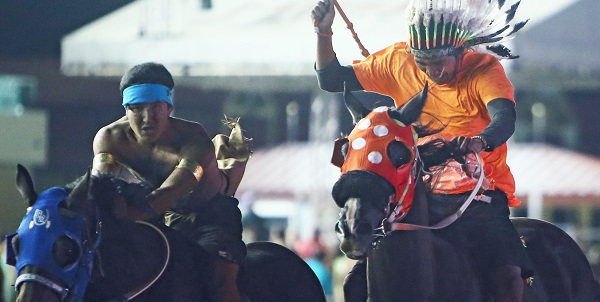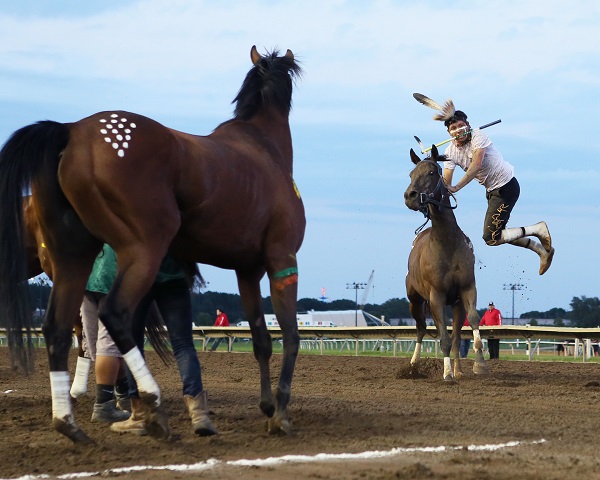BY JIM WELLS
The Great Sioux Nation once spread over what became five states and more, encompassing what the Oyate – the people – called the Ocheti Sakowin, the seven council fires, a tribe that spoke the same language with three distinct dialects – Dakota, Lakota and Nakota.
For hundreds of years, dating to the time Spanish horses made their way north to the American Great Plains, a horse culture became embodied in their culture and spirituality. They also knew how to socialize and celebrated racing their horses against one another.
The stories have been passed down over the generations in the oral history of the Oyate, keeping alive an ancient sport and pastime – Indian relay racing.
The sport is alive and well in the family of Richard Longfeather, a man steeped in the history of the Lakota culture, its oral history and its connection to the horse.
More significantly, Longfeather is a first language speaker of Lakota, raised by his grandparents in an environment that didn’t include English. He switches easily from one tongue to the next, pointing out the differences in meaning and significance between the two languages.
His family is from the Standing Rock Reservation, most recently newsworthy for its stand against the Dakota Pipeline access.
The Longfeathers arrived in Shakopee this week for the annual Indian relay races at Canterbury Park, three days of races culminating with a championship staged in conjunction with Saturday’s $200,000 Mystic Lake Derby, the richest race of the season.
It is Richard Longfeather’s belief that keeping his sons active in the sport is a proven deterrent to the destructive elements that plague many reservations, drugs and the crime related to them.
And keeping Lakota alive in the family is a necessary means of preserving their Indian culture and identity. “Without the language, you don’t have the culture,” he explained.
There are words in Lakota, for example, that explain things about the culture, but without English equivalents. There are ideas in Lakota for which there are none in English.
Some Lakota laughed when they watched the movie Dancing With Wolves. The language was correct, but in some cases female expressions were used by men.
Longfeather grew up with horses and cattle. The boys engaged in team roping, the girls in barrel racing. “At the end of each rodeo, we had relay racing,” he added.
Horses were a cultural aspect once his people acquired them, courtesy of the wild Spanish offspring that migrated north from South America, enabling the Lakota to widen their hunt for food, in particular for bison. “The Lakota always like to be identified with horses,” Longfeather said.
Now, Richard and Virginia Longfellow’s son Jace,19, is a bull rider and a relay racer. Jestin, 17, is a holder for the team, and their cousin Justin Fox, 18, is a setup man. The Longfellows have a daughter, Samantha, and two granddaughters in Texas.
Richard grew up living life in the “old” way, with the customs, traditions and what became the “poverty” of his culture. “We lived in a log cabin with no electricity or running water,” he said. After the death of his grandfather, his grandmother would send the 5-year-old Richard out to fetch water, instructing him what to do in Lakota.
“My grandparents used ice and straw to keep certain foods cold or frozen during the winter months. In the summer months we had fresh vegetables.”
Longfeather has been used at times to serve as an interpreter when elders in the tribe have been ill, or at other times to pass on the wishes of a family after they’ve lost a relative.
Longfeather is the only fluent speaker of Lakota in his family, although Virginia says she understands the language when her husband speaks it. Their sons do too, it seems.
Whenever he wants to make an important point, Longfellow asks for their attention in Lakota. “They stop and listen,” he said. “If I asked it in English, they wouldn’t pay any attention.”
The culture and its language clearly run deep.
RELAY RESULTS ON THURSDAY
Two heats were run on Thursday’s card and two more will accompany the Friday night card. The final and third place races will be run on Saturday.
Thursday’s winners were: Tissidimit, a Sho-Ban team from Fort Hall, Idaho. The winning rider was Jared Cerino, who won this competition two years ago.
Also, Scott Abrahamson won the second heat for the Abrahamson Relay team for the Colville tribe from Washington state.

